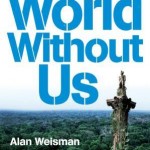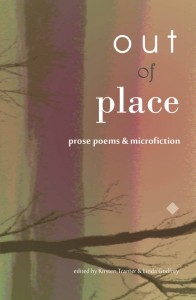
This week, we get to know a little more about Out of Place contributor, Melissa Beit. Based in northern NSW, Melissa’s short fiction has been published in a range of Australian journals and anthologies. To read Melissa’s harrowing microfiction, “Hospital Birth”, along with other great writing, click the cover of Out of Place below.
What inspired you to write the piece of microliterature which will appear in Out of Place? How would you describe this form of writing?
I foolishly and unrealistically set myself a new year’s challenge of writing a short story every week for a year (having been inspired by Ray Bradbury who asserted that it was almost impossible to write 52 bad stories in a row), and having just finished an 8000 word one, I wanted to tackle a shorter ‘easier’ one. Hah! Little did I know…
It turns out that it’s very difficult to fit a story into 300 words, and while the writing of the piece came quickly and easily, the editing took much longer than usual (“Not that the writing need be long, but it will take a long while to make it short.” Henry David Thoreau).
The theme of the competition, ‘out of place’, caught my eye as much as the word length, because I could so readily and accessibly recall a time in my life when I felt horribly out of place.
How do you know the point at which a piece you are writing should end? Do you have any favourite closing line/s from your own work or from another writer? If so, which ones and why?
In my personal experience, if a short story is ‘working’, it moves naturally and neatly towards an ending. If it isn’t, usually the whole thing is flawed and needs to be moved back into my file called Stories Under Construction, which is a bit like the ER, with triage nurses and everything. Some poor stories have been sitting in the waiting room with blood-soaked hankies pressed to their noses for years now.
I loved the last line in Arthur C Clarke’s 1956 Hugo Award winning short story “The Star”. But I’ve loved other short stories that haven’t necessarily ended with a bang or a twist, for the sheer mastery of the storytelling involved. The journey the writer took me on was more important than the destination.
Tell us about some of the writers that you’ve loved in the past and who you are reading now.
I don’t so much love writers as their works, and sometimes I will be disappointed by a book by a writer whose previous work I have loved; and sometimes I grumble about a writer’s novels but love his or her essays or vice versa.
 I have loved so many books, but right now I’m reading a non-fiction book by Alan Weisman called “The World Without Us”, which is fulfilling my yearning to know what a post-human world might be like. I’m reading Anne Lamott’s “Bird by bird”, and a Masterworks Sci-Fi book by Leigh Brackett (“The Long Tomorrow”), and Chloe Hooper’s incredible “The Tall Man”. I’m reading “One More River” by Lynn Reid Banks to my twelve year old, “Truckers” by Terry Pratchett to my eight year old, and “The House at Pooh Corner” to my four year old. And I’m reading a wonderful, soothing little book about compost, called (drumroll), “The Compost Book”.
I have loved so many books, but right now I’m reading a non-fiction book by Alan Weisman called “The World Without Us”, which is fulfilling my yearning to know what a post-human world might be like. I’m reading Anne Lamott’s “Bird by bird”, and a Masterworks Sci-Fi book by Leigh Brackett (“The Long Tomorrow”), and Chloe Hooper’s incredible “The Tall Man”. I’m reading “One More River” by Lynn Reid Banks to my twelve year old, “Truckers” by Terry Pratchett to my eight year old, and “The House at Pooh Corner” to my four year old. And I’m reading a wonderful, soothing little book about compost, called (drumroll), “The Compost Book”.
What you do if you haven’t written anything in a while and you want to get started writing again? Share one of your favourite writing exercises with our readers.
My most effective writing exercise is to show up to work. I have two 9am-3pm writing days a week and I make sure I sit down at 9 and leave at three (with food breaks…). The more I write, the more I want to write.
I also have several different projects on the go at once, so that I can dabble between them, depending on my mood and how much sleep I got the night before.

One of my favourite writing exercises came from Joe Brainard via Glenda Adams. You write down twenty-five different memories from your childhood, each one beginning with the words ‘I remember’. Short, vivid snapshots of your early life. Willa Carther said that most of the material a writer works with is acquired before the age of fifteen.
I shared that quote with my husband the other night. I said maybe we were making life too pleasant for our kids. I said maybe we should be locking them in a closet for a while, or dumping them on the highway and ordering them to walk home, so as to give them more range as writers. He looked at me strangely and said that there is a very good chance that none of them will want to be writers when they grow up.
Poor things.
